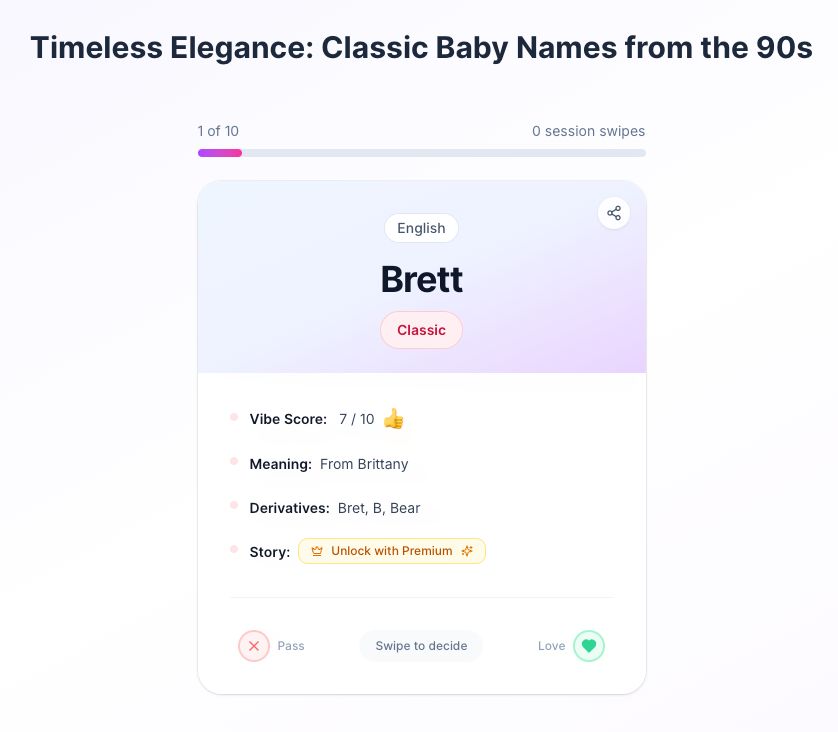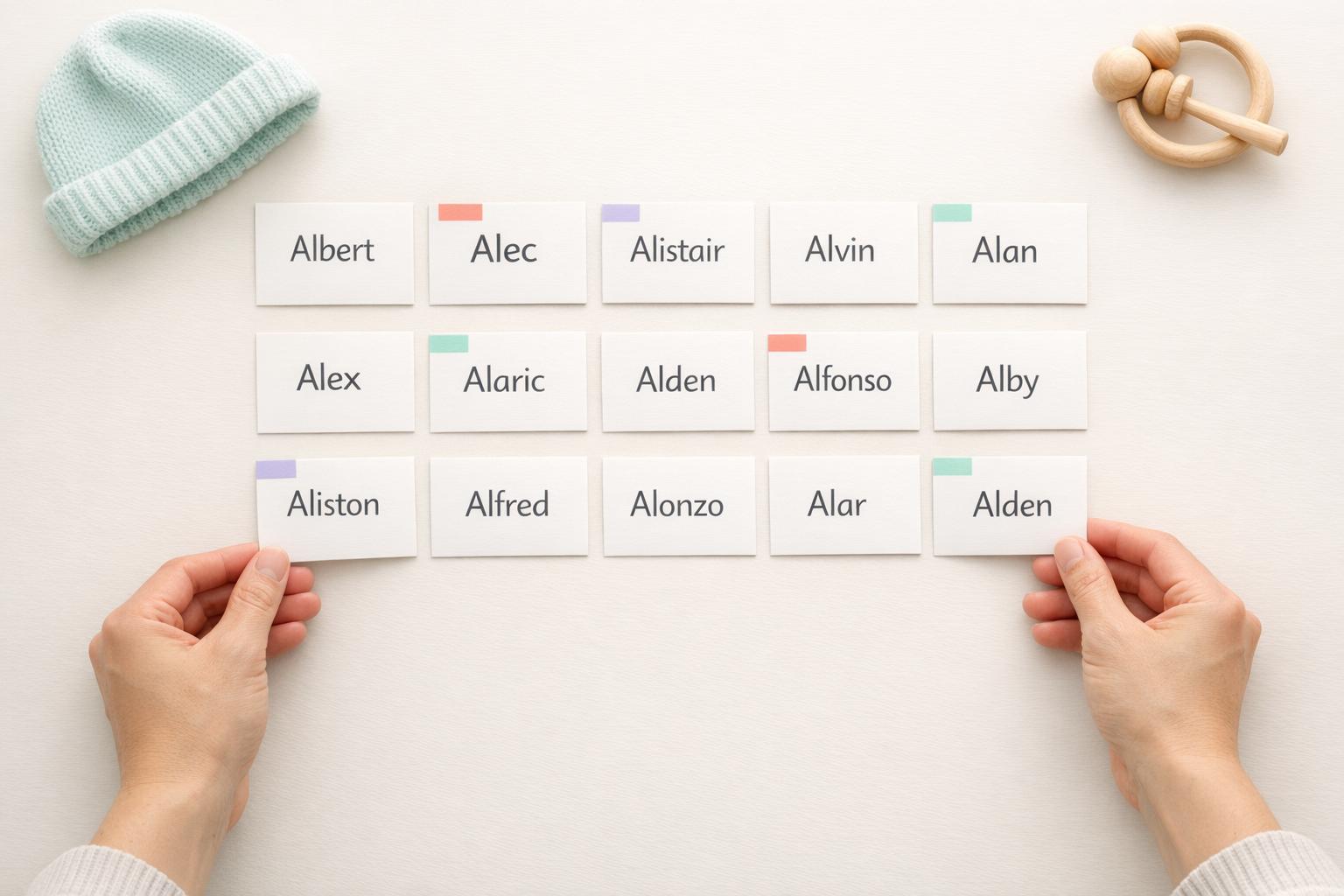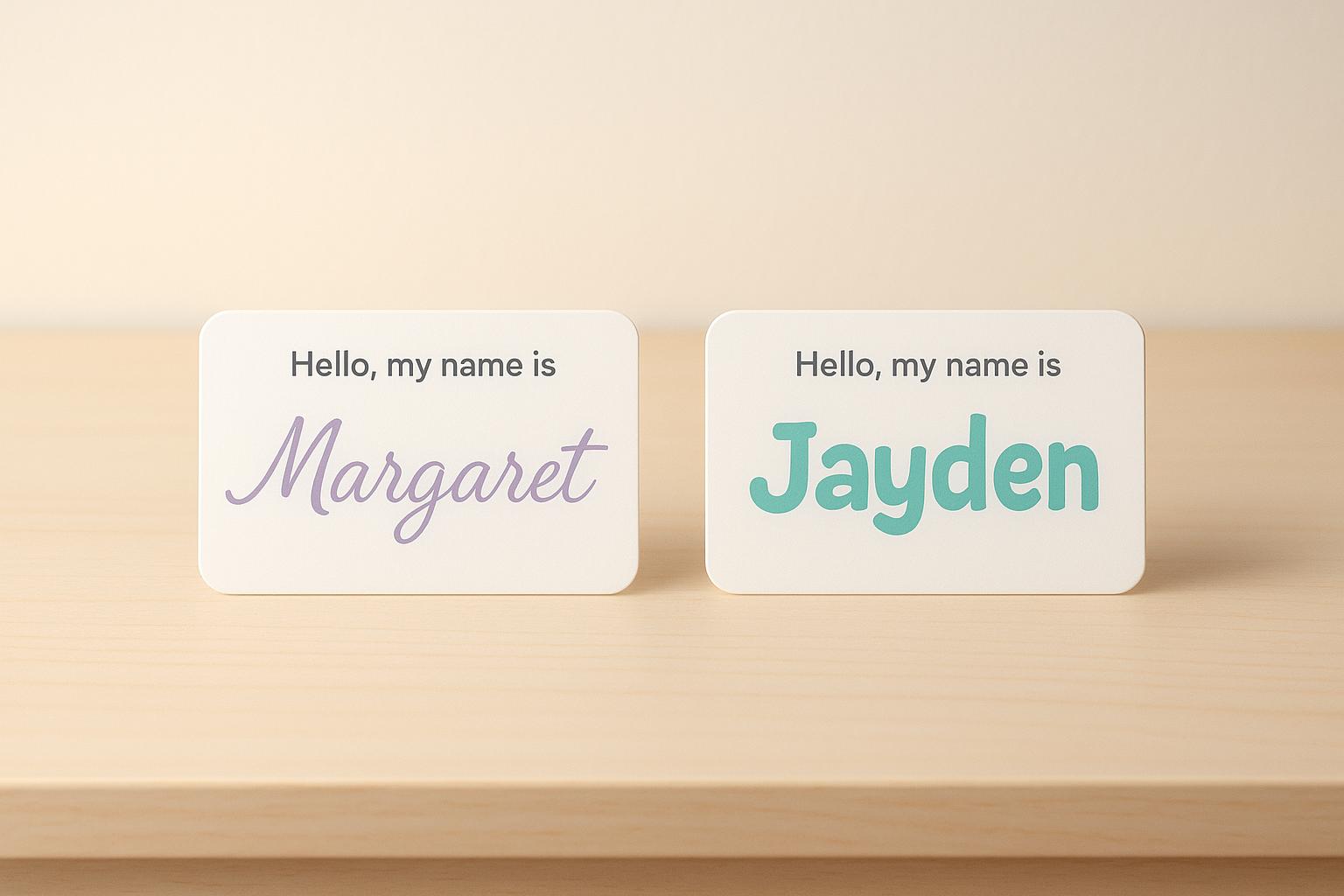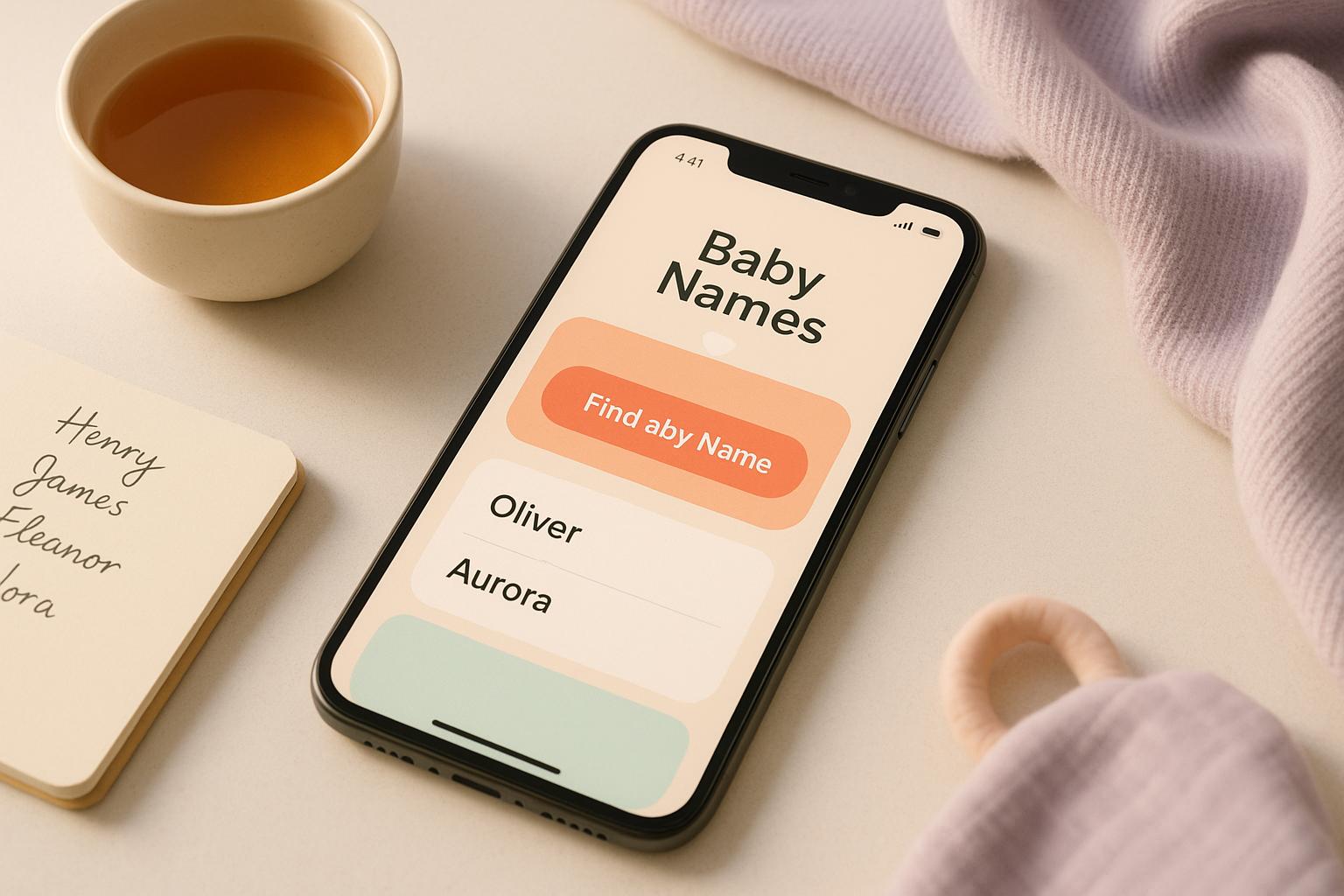Choosing the right name for your baby isn’t just about personal preference - it can influence your child’s early development. Research shows that babies recognize their names as early as 4 to 6 months, making name recognition one of the first steps in building memory, attention, and language skills. Here’s what you need to know:
- Simple, clear names are easier for babies to recognize and help with early speech development.
- Repetition matters: Using a baby’s name during everyday routines strengthens emotional bonds and cognitive growth.
- Positive associations: Names tied to happy memories or cultural roots can boost self-esteem and create a sense of belonging.
- Balance uniqueness and familiarity: A name that stands out but isn’t overly complex can make social interactions smoother.
Tools like NameHatch can help parents pick names that align with these principles, offering suggestions based on sound clarity, cultural significance, and developmental needs. Start early, test names out loud, and focus on consistency to give your baby the best start.
The Science Behind Name Recognition and Brain Development
Understanding how babies recognize and respond to their names sheds light on early cognitive development. Studies in developmental neuroscience highlight that name recognition is one of the first steps in language learning and plays a key role in overall brain growth.
When Babies Start Recognizing Their Names
Babies begin identifying their names surprisingly early in life. Research indicates that even in the first few months, infants show distinct brain activity when they hear their name compared to other sounds. This recognition often appears before other language milestones, with babies demonstrating their awareness by turning their heads or focusing their attention. Brain imaging reveals that hearing their name activates areas responsible for processing sound, attention, and memory.
The Role of Name Recognition in Brain Development
Recognizing their name does more than grab a baby’s attention - it strengthens important cognitive systems. This early skill helps improve memory and focus, especially when caregivers use the baby’s name consistently in everyday interactions. These moments not only reinforce language learning but also nurture emotional bonds, as babies associate their name with positive experiences. Over time, this process supports the development of communication skills by engaging the brain’s memory and attention networks.
The Importance of Repetition and Positive Context
How caregivers use a baby’s name significantly impacts its developmental benefits. Repeating a baby’s name during daily routines - like feeding, playtime, or bedtime - helps solidify recognition through consistent, positive reinforcement. This repetition also fosters secure attachment and emotional regulation. Many caregivers instinctively use a sing-song tone, known as parentese, which makes the name stand out and captures the baby’s attention. Starting interactions with the baby’s name not only signals connection but also prepares them for further communication, laying the foundation for future language skills and cognitive growth.
Expert Tips for Names That Support Brain Development
When it comes to choosing a name for your baby, it’s not just about personal taste or family traditions. The name you select can actually play a role in your child’s brain development, helping them process and recognize their identity. Here are some expert-backed strategies to consider when picking a name that supports your baby’s cognitive and emotional growth.
Choose Names That Stand Out
Names with distinct sound patterns are easier for babies to pick out from background noise. For instance, names like Maya, Leo, or Zoe have clear, sharp sounds that make them more recognizable. This can help infants differentiate their name early on, which is an important step in their cognitive development.
Keep It Simple and Easy to Say
Shorter names with two or three syllables are not only easier for babies to recognize but also help with early speech development. These names are often perceived as approachable and trustworthy. When choosing a name, think about how it sounds when spoken aloud, especially in the sing-song tone caregivers naturally use with babies. If you prefer a longer or more complex name, consider including a simpler nickname option to make it easier for your child to learn and use.
Pick Names with Happy Connections
Names tied to joyful family moments or positive emotions can foster a sense of security and boost self-esteem. Whether it’s a name you associate with a cherished memory or one you enjoy saying during bedtime stories or playtime, these connections can create a nurturing environment for your child.
Names with uplifting meanings or personal significance also strengthen a child’s sense of identity. For example, research on the "name-letter effect" suggests that people tend to favor the letters in their own name, linking names closely to self-identity and even shaping long-term preferences. Sharing the story or meaning behind their name can add an extra layer of connection and pride.
Find the Right Mix of New and Familiar
Striking a balance between uniqueness and familiarity is key. A name that’s too unusual might lead to frequent mispronunciations or spelling challenges, which could impact social interactions and confidence. On the other hand, a name that’s overly common might not feel special. Look for names that are recognizable but not overly popular, helping your child stand out in a positive way while avoiding unnecessary difficulties.
Match Your Family and Cultural Background
Choosing a name that reflects your family’s traditions and cultural heritage can give your child a strong sense of connection to their roots. When a name aligns with your family’s linguistic and cultural context, it’s more likely to be pronounced correctly and appreciated by relatives and the wider community.
This doesn’t mean you have to stick strictly to traditional names. Instead, aim for one that honors your background while fitting comfortably within your community. Such a choice can help your child develop a well-rounded sense of identity that bridges both their family and social environments.
"Infants use their own names as social cues", explain researchers Maithri Sivaraman, Ph.D., and Tricia Striano Skoler, Ph.D. "The name cue helped infants to pay attention and process new information".
Choosing a name is about more than what sounds good - it’s about selecting a name that becomes a meaningful part of your child’s early development. The right name can support their growing brain, help them feel connected to their family and culture, and even shape how they see themselves as they grow.
How NameHatch Helps You Choose Better Names

NameHatch takes the guesswork out of selecting names by combining cognitive insights with AI-powered tools. Its features are designed to help you choose names that not only resonate with your personal preferences but also support early brain development. Here's how NameHatch brings these principles to life.
Custom AI Name Suggestions
NameHatch uses AI to analyze your preferences - like sound clarity, syllable count, and cultural importance - to generate name suggestions tailored to your needs. The platform doesn’t just stop at one set of options. It learns as you go. If you favor names with clear, easy-to-recognize sounds, the system adapts and prioritizes similar suggestions that align with these criteria.
What’s more, the AI takes into account your cultural background and family traditions. For instance, if you’re looking for names with specific origins or meanings, it’ll weave those into its recommendations without compromising on phonetic clarity or positive associations. This ensures you’re presented with names that balance personal significance and cognitive benefits.
Partner Features for Couples
NameHatch also recognizes that naming decisions are often a team effort. Its partner matching feature allows couples to explore names independently while staying connected. When both partners like the same name, the platform sends an instant notification, making the decision-making process smoother.
You can save and share favorite names, adding notes about why certain ones stand out - whether it’s their simplicity, pronunciation, or meaningful family ties. This shared space fosters collaboration and helps partners align their priorities. For instance, one partner might focus on names that are easy to pronounce, while the other values cultural or emotional significance. NameHatch blends these perspectives, helping you find options that work for both parents and, ultimately, support your baby’s development.
Smart Filters for Brain-Friendly Names
To make the search even easier, NameHatch offers smart filters like Classic, Nature-Inspired, Strong, and Soft. These filters help you zero in on names that fit specific cognitive principles, such as familiar sound patterns or positive associations. For example, you can focus on two- or three-syllable names, which are ideal for early speech development.
The Nature-Inspired filter highlights names like River, Sage, or Luna, which often evoke calming imagery and emotions - qualities that can nurture a child’s sense of security and self-esteem. Meanwhile, the Strong and Soft filters help you sort names by their phonetic qualities. Strong names like Max or Zara have sharp, clear sounds that babies can easily pick out from background noise. On the other hand, soft names like Lily or Noah offer gentle yet distinct sound patterns.
You can even combine filters to refine your search further, ensuring the names you choose meet multiple developmental criteria. Whether you’re drawn to traditional names, nature-inspired ones, or something entirely unique, NameHatch makes the process intuitive and meaningful.
sbb-itb-f13f980
Different Naming Approaches: What Works Best for Brain Growth
Names can do more than just identify us - they can shape perceptions, foster connections, and even influence cognitive development. With that in mind, choosing the right naming approach becomes a meaningful decision. Each approach offers distinct advantages and challenges, as outlined below.
Traditional names like Elizabeth, William, or Catherine are timeless and familiar, which can make them easier for others to recognize. However, their popularity might lead to less individuality in settings where many peers share similar names.
Modern names - think Aria, Kai, or Luna - often stand out with their fresh, distinctive sounds. Names like Zoe or Leo, for example, balance modern appeal with ease of pronunciation, making them memorable and approachable.
Heritage names (e.g., Santiago, Priya, Akira) connect children to their family roots and cultural identity. These names often carry unique sound patterns, but it’s important to ensure they’re easy for both your child and others to pronounce and remember.
Short versus longer names also brings an interesting dynamic. Short names like Grace or James are straightforward and quick to recognize, while longer names like Alexander or Isabella offer flexibility with nickname options, providing room for personal expression.
Naming Strategy Comparison Chart
Here’s a quick comparison of these naming strategies to help you weigh the options:
| Approach | Cognitive Benefits | Potential Challenges | Examples |
|---|---|---|---|
| Traditional Names | Familiarity that supports recognition | May feel too common in group settings | Michael, Sarah, David |
| Modern Names | Distinct and appealing sound patterns | May lack strong cultural or historical ties | Aria, Kai, Nova |
| Heritage Names | Builds connection to cultural and family identity | Could be harder to pronounce for some | Santiago, Priya, Akira |
| Short Names | Easy to pronounce and quick to recognize | Limited options for nicknames | Max, Zoe, Jack |
| Longer Names | Allows for versatile nicknames | Might not be immediately recognizable | Alexander, Gabriella, Sebastian |
Blending elements from these strategies often leads to the most well-rounded choice. For instance, a name like Sofia strikes a balance - it’s familiar, easy to recognize, and rich with cultural significance. Similarly, Owen combines modern charm with a timeless simplicity.
In diverse communities, a name that’s easy to pronounce across different languages can be especially helpful. Meanwhile, a name honoring cultural heritage can provide emotional depth and a sense of pride. The key is consistent use of the name from birth, paired with positive associations, to help your child grow into it with confidence and joy.
Making Smart Name Choices for Your Baby
Picking the right name for your baby is about more than just how it sounds - it can also play a role in their cognitive and social development. A simple way to test potential names is to say them out loud in different scenarios. Hearing how a name flows in everyday conversation can help you decide if it feels natural and fits comfortably in real-life situations.
It’s also important to think about your child’s future environment. If you live in a multilingual or diverse community, choosing a name that’s easy to pronounce across different languages can boost your child’s confidence in social settings. Additionally, consider how the name will grow with your child - from their early years to their professional life. Tools like NameHatch can make this process easier by offering personalized suggestions and smart filters, helping you find a name that balances style, meaning, and practicality.
NameHatch’s AI-powered platform even includes a partner-matching feature, making it easier for couples to agree on names that align with their preferences and meet developmental considerations. Starting your search early in pregnancy gives you time to refine your list. Many parents find that their preferences shift over time - names they initially loved might lose their appeal, while others may grow on them. By the third trimester, narrowing your list to three to five names can help you make a confident choice once you meet your baby.
Once your baby arrives, consistency becomes key. Using their name frequently in positive and loving interactions can help support early cognitive development.
The best baby names strike a balance between personal significance and practical considerations. A name that reflects your heritage while being easy for others to pronounce and remember can offer both a meaningful connection and social ease for your child.
FAQs
How can the name I choose for my baby influence their cognitive and language development?
Your baby's name is more than just an identifier - it’s a building block for their early cognitive and language development. Recognizing their name is one of the first milestones that helps them engage more during conversations, follow instructions, and begin connecting their name to other words. This process also boosts auditory processing, a key element in language learning and overall brain development.
Selecting a name that's simple for your baby to recognize and respond to can ease these early steps, laying the groundwork for their future growth.
How can I pick a baby name that feels unique but is still easy to recognize?
Choosing a name is an exciting and meaningful task, but it’s all about finding the sweet spot between standing out and being recognizable. Go for names that feel distinct yet are simple to pronounce and spell. Steer clear of overly complicated or obscure choices that might lead to confusion, and sticking with familiar spellings can make life easier for everyone.
Think about drawing inspiration from things that matter to you - like your personal passions, family traditions, or even historical icons. Just make sure the name is approachable enough to help your child feel comfortable and confident as they grow and interact with the world.
How can using a baby's name daily help with their cognitive development?
Using your baby's name regularly in daily interactions can have a powerful impact on their cognitive and emotional growth. Whether you're engaging in face-to-face chats, pointing out objects, or simply trying to get their attention, saying their name often helps sharpen their focus, improve recognition, and boost language development.
When your baby reacts to hearing their name and you respond with warmth, it strengthens their grasp of social cues and deepens your bond. These seemingly small moments play a big role in shaping the brain pathways needed for communication and learning right from the start.



